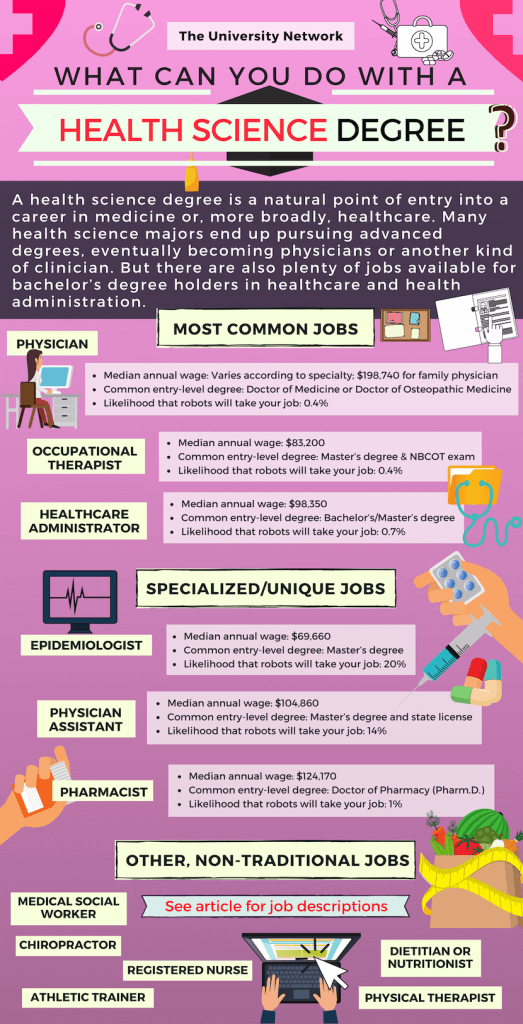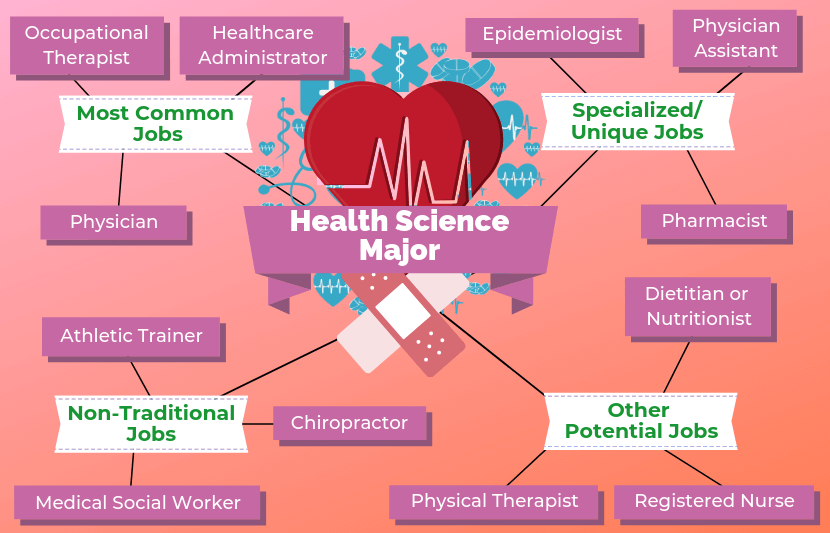A health science degree is a natural point of entry into a career in medicine or, more broadly, healthcare. Many health science majors end up pursuing advanced degrees, eventually becoming physicians or another kind of clinician. But there are also plenty of jobs available for bachelor’s degree holders in healthcare and health administration.
Here is a list of 12 possible jobs for health science majors.
Most Common Jobs for Health Science Majors
1. Physician
Unsurprisingly, many health science majors go on to become physicians. Physicians, or medical doctors, are professionals who examine and diagnose patients, and treat injury and illness. The term “physician” refers to a wide range of medical practitioners that may include family and general doctors who treat a range of everyday conditions and illnesses, pediatricians who treat children and young adults, general internists who provide nonsurgical treatment for problems that affect internal organs, or a wide variety of specialists who have expertise and treat specific organs or conditions. Becoming a physician requires a lot of time and hard work. After you get your bachelor’s degree, you’re going to need to take the Medical College Admissions Test (MCAT), attend medical school for 4 years and earn a medical degree, and then complete a residency program, which typically takes 3-7 years depending on your specialty.
Median annual wage: Varies according to specialty; $198,740 for family physician
Common entry-level degree: Doctor of Medicine/Doctor of Osteopathic Medicine degree
Likelihood that robots will take your job: 0.4%
2. Occupational Therapist
Occupational therapists treat ill, injured, and disabled patients with a variety of therapies to help them live with or recover from their conditions. Occupational therapists typically specialize in treating individuals with a particular condition and utilize therapeutic methods that are specifically catered to their patients and ailment. Typically, they also advise individuals to help them live more independently and mitigate risks in their lives. For example, occupational therapists who work with permanently disabled individuals may recommend specialized equipment like wheelchairs and assist them in performing daily tasks. To become an occupational therapist, you will need a master’s degree or doctorate in occupational therapy. Occupational therapists must also pass an exam to become registered by the National Board for Certification in Occupational Therapy (NBCOT).
Median annual wage: $83,200
Common entry-level degree: Master’s degree & NBCOT exam
Likelihood that robots will take your job: 0.4%
3. Healthcare Administrator
Healthcare administrators work at the intersection of medicine and business, managing hospitals, clinics, or other medical practices. They are responsible for managing their facility’s finances, managing its day-to-day operation, ensuring that it is providing efficient and quality healthcare, and complying with changes in regulations. The minimum requirement to become a healthcare administrator is a bachelor’s degree, but many employers seek out candidates with master’s degrees or even doctorates. Nursing home administrators must be licensed according to state requirements. Healthcare administrators in other kinds of organizations do not typically need to be licensed.
Median annual wage: $98,350
Common entry-level degree: Bachelor’s/Master’s degree
Likelihood that robots will take your job: 0.7%

Specialized/Unique Jobs for Health Science Majors
4. Epidemiologist
Epidemiologists are experts in disease who are not health practitioners but rather work in research and applied public health. Using statistical models, they track the spread, causes and patterns of diseases. Epidemiologists may work for government, assisting with disease education and public policy formulation. They may also work in research positions at universities, private research institutions like insurance or pharmaceutical companies, or public agencies like the Center for Disease Control and Prevention (CDC) or the National Institutes of Health (NIH). Others work in hospitals, creating strategies and taking measures to prevent the spread of diseases. A master’s degree is generally required for employment as an epidemiologist.
Median annual wage: $69,660
Common entry-level degree: Master’s degree
Likelihood that robots will take your job: 20%
5. Physician Assistant
Physician assistants (PAs) work with doctors in all areas of medicine to care for patients. Their job may include examining patients and their medical histories, diagnosing illness and injury, providing treatments or administering shots, and prescribing medicine. Physician assistants are sometimes the primary care provider in hospitals or clinics where physicians are only present part-time. Physician assistants typically need a master’s degree and licensure from the state they practice in.
Median annual wage: $104,860
Common entry-level degree: Master’s degree & license
Likelihood that robots will take your job: 14%
6. Pharmacist
Pharmacists are responsible for filling and providing patients with prescription drugs, educating patients about the use of medications, and communicating with doctors about medication interactions and issues. In order to become a pharmacist, you will need to hold a Doctor of Pharmacy degree. These programs typically take 4 years and require a minimum requisite of 2 years of undergraduate study (though some may require a bachelor’s degree).
Median annual wage: $124,170
Common entry-level degree: Doctor of Pharmacy degree
Likelihood that robots will take your job: 1%
Non-Traditional Jobs for Health Science Majors
7. Medical Social Worker
Medical social workers help patients and their families and friends navigate the healthcare system and cope with illness. Medical social work is a multifaceted profession that brings together counseling, education, advocacy, and research. Essentially, they serve as the primary support system for individuals struggling with illness. Medical social workers must have a master’s degree in social work and two years of supervised experience in a clinical setting before they can become licensed.
Median annual wage: $54,870
Common entry-level degree: Master’s degree in Social Work
Likelihood that robots will take your job: 0.4%
8. Chiropractor
Chiropractors are specialists in the neuromusculoskeletal system. They use a variety of non-invasive and holistic therapies and techniques to treat their patients. Chiropractic is considered an alternative or holistic medicine, and chiropractors are not medical doctors. They do not prescribe drugs or perform surgeries, but rather treat conditions with manual spinal adjustments and manipulation. They do, however, undergo extensive training. In order to become a licensed chiropractor, you will need to earn a Doctor of Chiropractic (D.C.) degree and pass the National Board of Chiropractic Examiners (NBCE) exam.
Median annual wage: $68,640
Common entry-level degree: Doctor of Chiropractic degree & NBCE exam
Likelihood that robots will take your job: 3%
9. Athletic Trainer
Athletic trainers are professionals who work with athletes of all ages and levels to prevent, diagnose, and treat muscle and bone injuries and illnesses. They are not medical doctors but rather the first stage of treatment for athletic injuries, providing first-aid and emergency care and assisting in the rehabilitation process. In order to become an athletic trainer, you will need at least a bachelor’s degree. Some employers may prefer or even require a master’s degree. Most states also require certification from the Commission on Accreditation of Athletic Training Education (CAATE).
Median annual wage: $46,630
Common entry-level degree: Bachelor’s degree
Likelihood that robots will take your job: 0.7%
Other Jobs for Health Science Majors
10. Dietitian or Nutritionist
Dietitians and nutritionists are experts in food and nutrition who create customized diets for clients or patients based on their health and nutritional needs. The majority of dietitians work in a clinical setting, whether in a hospital, an outpatient care center, or a private practice working with individual patients to promote their overall health or manage an illness. Others are employed by the government or organization and tasked with planning food programs or advising policymakers and officials on issues of health and nutrition. Dietitians typically have at least a bachelor’s degree, and sometimes an advanced degree. Many states also require dietitians to be licensed in order to practice.
Median annual wage: $59,410
Common entry-level degree: Bachelor’s degree
Likelihood that robots will take your job: 0.4%
11. Physical Therapist
Physical therapists work with patients to recover from physical injuries or illnesses, assisting them so that they can gradually regain control over their bodies and pain. Becoming a physical therapist requires advanced training. You’ll need to complete a Doctor of Physical Therapy degree program, which typically takes 3 years. Many also complete a clinical residency program, which typically takes about a year.
Median annual wage: $86,850
Common entry-level degree: Doctor of Physical Therapy degree
Likelihood that robots will take your job: 2%
12. Registered Nurse
Registered nurses (RNs) are the first line of care for most patients in healthcare institutions. Nurses work directly with patients, coordinating and administering patient care as well as educating, advising, and providing emotional support for patients and their families. They typically work on a team with doctors and may specialize in caring for a specific type of patient (oncology nurses work with cancer patients, for example). To become a registered nurse, you will need to graduate from an accredited nursing program. Many aspiring nurses pursue a Bachelor of Science degree in nursing (BSN) or an associate’s degree in nursing (ADN). Others may receive a diploma in nursing from an approved program at a clinic or a hospital. If you are pursuing or have already attained a bachelor’s degree in a different science (such as health science), you will need additional education in order to become a nurse. You could pursue a master’s degree in nursing, or enroll in an accelerated nursing program for bachelor’s degree holders.
Median annual wage: $70,000
Common entry-level degree: Approved nursing education program
Likelihood that robots will take your job: 0.9%
10 Famous People who Studied Health Science
- Nathan Ghar-jun Adrian, competitive swimmer and Olympic Gold medalist
- Rebecca Alexander, psychotherapist and author
- Christy Turlington Burns, model
- Neil Gesundheit, professor of medicine
- Catherine M. Heaney, professor of psychology and medicine
- Susan Desmond-Hellmann, business executive
- Fernando S. Mendoza, professor of pediatrics
- Brian Kamoie, public health administrator
- David M. Senior, business executive
- Dorothy Louise Slaughter, politician
To explore options for other majors, click here.



